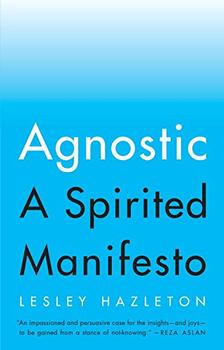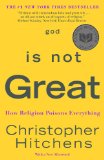Summary | Excerpt | Reviews | Beyond the book | Read-Alikes | Genres & Themes | Author Bio

How I Lost My Faith Reporting on Religion in America—and Found Unexpected Peace
by William LobdellOne way I can tell whether a nonfiction book has met its goal is if, after
finishing it, I want to call the author and invite him/her to lunch. I have to
say that nothing would make me happier than spending a quiet spring afternoon
sipping a nice sauvignon blanc and chatting with Bill Lobdell. I feel just that
close to him. More than that, I feel we are kindred spirits; battered souls on a
quest to make sense of a confusing world. Better yet, I think there are more
people who have a lot more in common with Lobdell (if truth be told) than might
be ready to admit it. Because who among us does not have a personal story of
love gained and lost? And what is religion if not organized love targeted toward
a spiritual entity? In view of that, who has sought enlightenment and something
to believe – really believe – in, only to feel sand-bagged when the recipient of
our faith turned out to have feet of clay?
It happened to Lobdell -- but he is not bitter. It is what makes his account
so effective. He relates the story by employing the excellent reporting skills
that made his column so popular in the Los Angeles Times. The details are
intimate. Intimate? How about almost painfully personal? He admits that as a
young man he was a rascal; leading a life more directed toward something
resembling self-destruction than toward a promising future. Many young people
struggle to find their way and Lobdell's struggle, characterized by excesses, a
failed marriage and a dead-end job, caused him and his family heartache and
embarrassment. Then - around the same time he learned that his girlfriend was
pregnant with his baby - he became a seeker.
Like many, he'd abandoned the religion of his parents when he was a
teenager. But that didn't keep him from feeling there was something seriously
missing in his life. Over a decade later, with a brand new – if unanticipated –
family he still felt lost. A friend invited him to a weekend retreat. It marked
the beginning of what would become a quest for spiritual fulfillment. Convinced
that what he really sought was God through religion he began to become more and
more involved in a Christian church and the Bible.
His luck started to change. He took better care of himself. His acne
cleared up. Money even started coming in. He landed a job at the LA Times
and ultimately became their religion columnist. Lobdell dutifully thanked the
God he believed genuinely cared about him on a personal level. Everything he
prayed for seemed to materialize. Moreover, all the great things he wrote about
for his Times column reinforced his faith. As he says, believers see
God's hand everywhere. Eventually he gravitated toward Catholicism. He and his
wife began studying to become Catholics.
The good thing about being an LA Times religion columnist is that you
are kept at the forefront of the very latest news about God and religion the
world over. The bad thing is that you are still at the forefront when there is
scandal within religious circles. Thus even before general news outlets broke
the story of alleged child abuse committed by Catholic priests, Lobdell had
details of the first lawsuit on his desk. At first he tried to ignore it, or at
least play it down. It not only threatened everything he believed in but
everything he'd based a lifelong career on. But the truth would not back down.
It demanded to be heard. The crimes, the sins, the cover-ups, the corruption,
the secrecy, the collusion; betrayal mounted on top of betrayal. He was
disgusted.
Like the paint on a religious statue in an ancient church, Lobdell's faith began to chip and peel. The questions and doubts tormented him
as he neared the day he was slated to be baptized a Catholic. Finally he decided
he could not go through with it. How could those despicable people not be struck
down by the God of what was supposed to be the one true Church? In light of his
knowledge of acts of blatant fraud, misrepresentation and malfeasance among
protestant clergy and televangelists he concluded, "I just couldn't find any
evidence within Protestantism or Catholicism that…their religion made them
ethically or morally any better than atheists."
Even though in hindsight he found logical explanations for all the good luck
he'd previously attributed to God and even though he is now a religion writer
with no religion – translation: jobless – he has managed to find peace. At least
he knows he can make good things happen in his own life. QED, this fine book
that ought to provoke thought and self-reflection for the masses (like me) who
have also loved and lost.
More about this book at BookBrowse, and also at the author's website.
![]() This review
first ran in the April 22, 2009
issue of BookBrowse Recommends.
This review
first ran in the April 22, 2009
issue of BookBrowse Recommends.

If you liked Losing My Religion, try these:

by Lesley Hazleton
Published 2017
A widely admired writer on religion celebrates agnosticism as the most vibrant, engaging - and ultimately the most honest - stance toward the mysteries of existence.

by Christopher Hitchens
Published 2009
Hitchens frames the argument for a more secular life based on science and reason, in which hell is replaced by the Hubble Telescope's awesome view of the universe, and Moses and the burning bush give way to the beauty and symmetry of the double helix.
Your guide toexceptional books
BookBrowse seeks out and recommends the best in contemporary fiction and nonfiction—books that not only engage and entertain but also deepen our understanding of ourselves and the world around us.